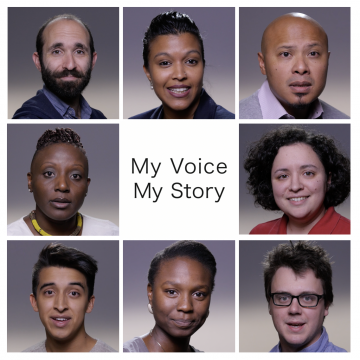My Voice, My Story
Understanding the Untold Lived Experiences of Graduate & Professional Students
 My Voice, My Story pairs video monologues – constructed from the experiences of real graduate students – with facilitated discussions. The primary objective of My Voice, My Story is to utilize the power of narrative to achieve a greater understanding of the depth and breadth of the lived experiences of graduate and professional students. Through stories and discussion, participants explore the many types of experiences within graduate education that frequently go untold, and learn and share strategies on how to create more inclusive and supportive research and mentoring environments.
My Voice, My Story pairs video monologues – constructed from the experiences of real graduate students – with facilitated discussions. The primary objective of My Voice, My Story is to utilize the power of narrative to achieve a greater understanding of the depth and breadth of the lived experiences of graduate and professional students. Through stories and discussion, participants explore the many types of experiences within graduate education that frequently go untold, and learn and share strategies on how to create more inclusive and supportive research and mentoring environments.
Learning Objectives
Listening to and discussing the stories of the characters portrayed in the My Voice, My Story monologues provides participants with opportunities for learning through:
- Listening for understanding, especially when we think we are different from one another.
- Understanding intent versus impact and the possible implications when the two don’t align.
- Developing awareness and understanding of experiences of exclusion and inclusion in research and mentoring environments.
- Establishing respect for our mutual similarities and differences.
- Experiencing empathy for and identification with all of the characters portrayed in the video monologues.
- Recognizing instances of implicit bias.
- Learning and sharing strategies on how one can contribute to improving the climate of research and mentoring environments.
How long is a My Voice, My Story Session?
- 120 minutes: 20 minutes for introductions, opening, and content delivery; 20 minutes for videos; 70 minutes for facilitated dialogue; 10 minutes for closing
Focus Audiences
- Graduate and professional students
- Faculty
- Staff who work with graduate and professional students
Strategies for Successful My Voice, My Story (MVMS) Sessions
- Limit the audience size to no more than ~35 participants, and no less than 12 participants.
- Work in advance with the MVMS facilitation team to schedule and plan the delivery of a MVMS session.
- Utilize a room with a set up that will help support easy engagement in large and small group discussions; avoid rooms with fixed sitting such as auditoriums.
- Consider how MVMS sessions could become part of the regular cycle of professional development programming for specific audiences within your graduate field, department, or college.
- Explore with the facilitation team how individual monologues from MVMS can be used in place of case studies for other programs such as mentor training.
- Share this article on how MVMS is using the power of personal narratives to advance inclusion and belonging.
Contact
Please contact Graduate School Associate Dean for Inclusion & Student & Faculty Engagement Sara Xayarath Hernández (grad_assoc_dean@cornell.edu) and Associate Dean for Professional Development Colleen McLinn (futurefaculty@cornell.edu) with questions about this opportunity.
This project was developed with the Cornell Interactive Theatre Ensemble through a collaboration of the Graduate School Office of Inclusion & Student Engagement, Graduate School Future Faculty and Academic Careers Program, College of Engineering, Cornell Bowers College of Computing & Information Science, College of Veterinary Medicine, College of Agriculture and Life Sciences, and the College of Human Ecology.
The launch and dissemination of this project also benefited from support from the 2016 ETS/CGS Award for Innovation in Promoting Success in Graduate Education and National Science Foundation under Award No. 1647094, CIRTL AGEP Transformation Alliance from 2016-2022. Any opinions, findings and conclusions or recommendations expressed in this material are those of the Cornell PI team and do not necessarily reflect the views of the National Science Foundation.
Sponsorship
The ongoing advancement of this initiative is co-led and supported by the Graduate School Office of Inclusion & Student Engagement and Future Faculty and Academic Careers Program.
